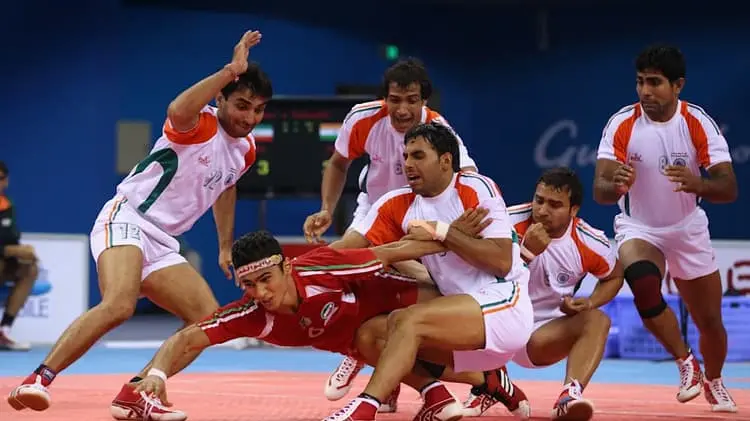The thunderous chant of “Kabaddi! Kabaddi! Kabaddi!” reverberates through jam-packed stadiums across India, Iran, and South Asia, capturing the essence of a fast-paced, high-intensity contact sport that commands the loyalty of hundreds of millions of fans worldwide.
Once confined to rural fields, kabaddi has evolved into a globally recognized spectacle, particularly with the rise of the Pro Kabaddi League (PKL).
Yet, a pressing question echoes through the minds of fans and athletes alike: Is kabaddi in the Olympics?
The short answer: Not yet. But the story behind kabaddi’s Olympic journey is rich with complexity, involving international governance, global participation criteria, media economics, and cultural expansion.
This article serves as the definitive guide to understanding why kabaddi is not in the Olympics, the current barriers to entry, and what the sport must do to secure a spot on the Olympic stage.
Why Kabaddi is Not in Olympics?
The International Olympic Committee (IOC) has a rigorous and multi-faceted set of criteria for admitting a new sport into the Olympic program.
While kabaddi excels in some areas, it falls short in others. The reasons for its absence are not a reflection of the sport’s quality, but rather of its current standing on the world stage. Let’s break down the core reasons why kabaddi is not in the Olympics.
1. Limited Global Reach and IOC Participation Criteria

One of the most significant hurdles preventing kabaddi’s Olympic inclusion is its lack of global universality, a core requirement set by the International Olympic Committee (IOC).
IOC’s Global Participation Standards:
- Must be practiced by men in at least 75 countries across four continents
- Must be practiced by women in at least 40 countries across three continents
Kabaddi today remains heavily regional, with dominant nations including:
- 🇮🇳 India
- 🇮🇷 Iran
- 🇧🇩 Bangladesh
- 🇵🇰 Pakistan
- 🇱🇰 Sri Lanka
While there is emerging interest in countries like the United Kingdom, Argentina, Poland, Kenya, and South Korea, the sport lacks the competitive depth and breadth to meet Olympic universality standards. For a sport to be considered among the most popular sports in India, it needs a more diversified international footprint to satisfy the IOC.
The “Two-Nation Dominance” Challenge
Kabaddi is often perceived as a battle between India and Iran for international supremacy. The IOC favors sports with unpredictable outcomes and a diverse medal pool.
Overconcentration of success in a few countries can harm a sport’s Olympic prospects.
2. Weak International Governance and Promotion
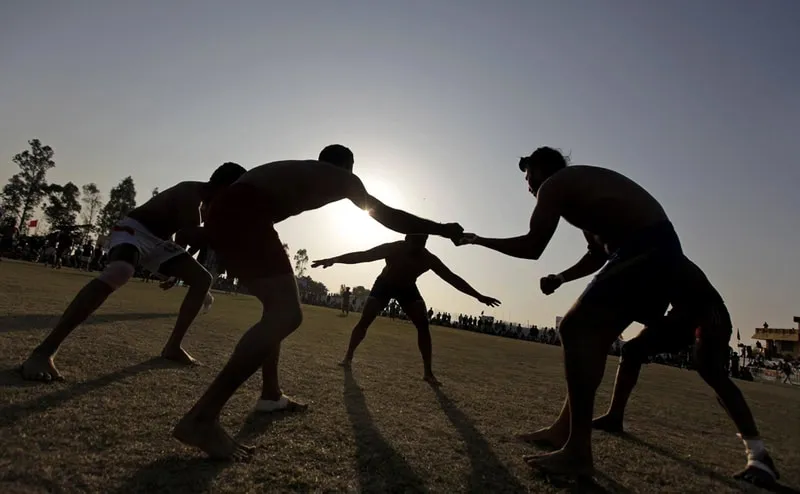
A unified, globally proactive International Federation is a mandatory requirement for Olympic inclusion. Kabaddi’s governing body, the International Kabaddi Federation (IKF), currently lacks the visibility and influence of bodies like World Rugby or the International Surfing Association.
Areas for Improvement:
- Global Development Campaigns: The IKF must replicate the long-term international marketing strategies seen in rugby, skateboarding, and sport climbing.
- Rule Standardization: Discrepancies in rules and match formats across regions can signal governance instability: a red flag for the IOC.
- Transparency and Compliance: Adhering to the Olympic Charter demands rigorous standards in ethics, anti-doping, and administrative transparency.
3. Infrastructure and Broadcasting Challenges
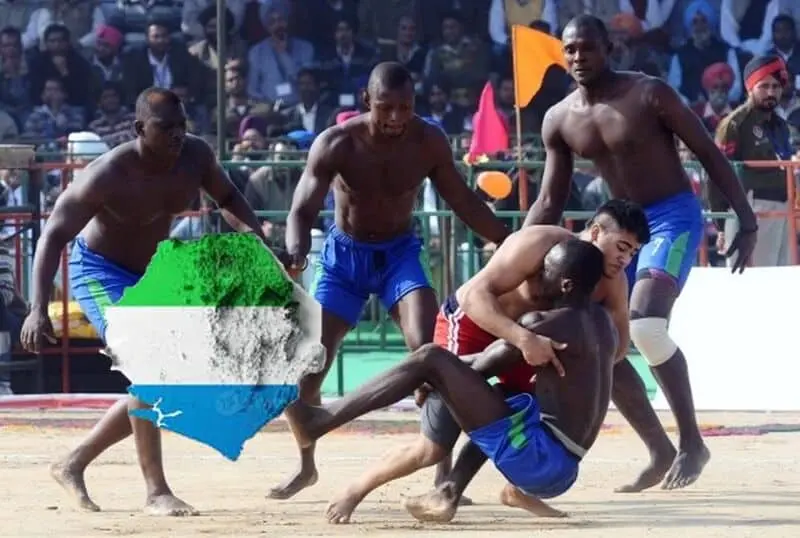
While kabaddi has relatively low infrastructure requirements (court size is similar to a badminton mat), its inclusion still raises logistical and financial concerns for host cities.
Broadcast Appeal and Commercial Viability
The IOC generates a majority of its revenue through global broadcasting rights. While kabaddi enjoys massive television audiences in South Asia, its global broadcast appeal is still unproven.
Without widespread engagement in Europe, North America, and Africa, broadcasters may hesitate to prioritize kabaddi during the Games.
4. Gender Parity Requirements
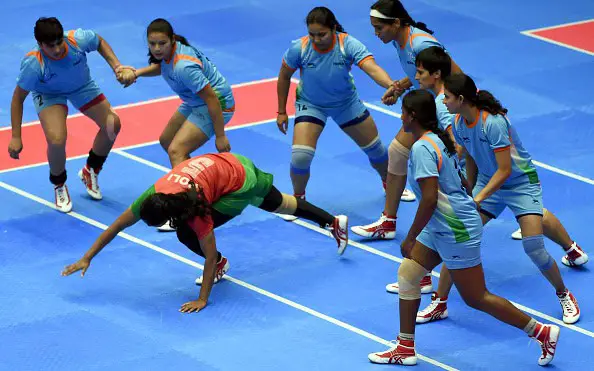
The Olympic Movement emphasizes gender equality. For kabaddi to be seriously considered, both men’s and women’s versions must be well-developed and internationally competitive.
Current Status:
- Women’s Kabaddi Growth: Rapid expansion through events like the Women’s Kabaddi World Cup and participation in the Asian Games.
- Remaining Gaps: Despite improvements, women’s kabaddi lacks depth in many countries, limiting global representation and competition quality.
5. Venue and Post-Games Legacy Considerations
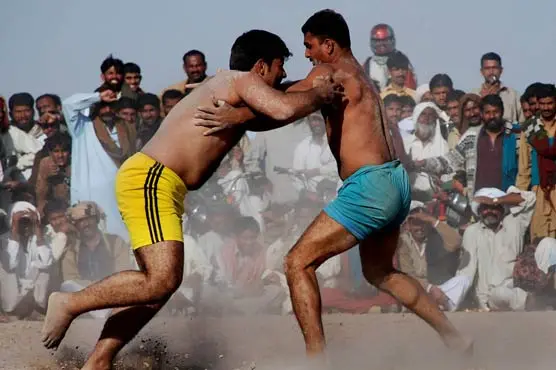
Kabaddi’s small playing area and minimal equipment needs make it logistically appealing. However, the IOC and host cities must assess legacy usage.
Will the facilities be used after the Games, particularly in Western countries where kabaddi is not widely played?
Its status as one of the most fun sports to play could be a key part of the legacy argument, promoting grassroots participation in new regions long after the Olympics conclude.
6. Olympic Athlete Quota and Calendar Congestion
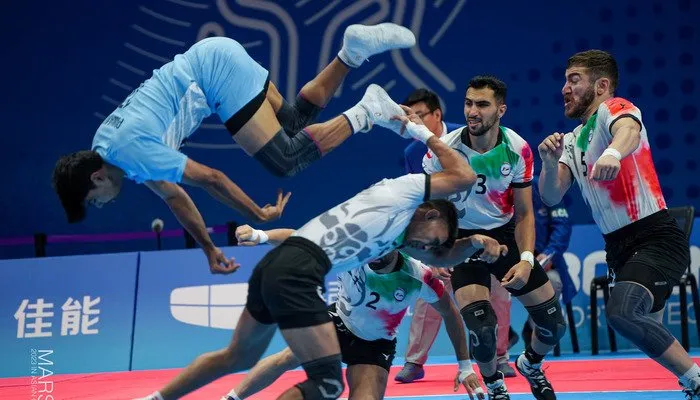
The IOC caps the Olympic athlete limit at around 10,500. Adding new sports often requires replacing others or sharing quotas.
For Los Angeles 2028 (LA28), the organizing committee has already proposed:
- Cricket (T20)
- Flag Football
- Lacrosse (Sixes)
- Squash
- Baseball/Softball
This leaves little room for additional sports like kabaddi in the current cycle.
The Road to the Olympics: Is Kabaddi in Olympics 2028?
The 2028 Summer Olympics are headed to Los Angeles (LA28). The organizing committee has the privilege of proposing additional sports to the IOC for inclusion.
This has been the pathway for sports like skateboarding, sport climbing, and surfing.
So, what about kabaddi in Olympics 2028?
The chances for 2028 are slim. The LA28 organizing committee has already proposed five sports for inclusion: Baseball/Softball, Cricket (T20), Flag Football, Lacrosse (Sixes), and Squash.
Cricket’s inclusion, in particular, is a nod to a global audience and a huge revenue generator, arguably occupying a similar demographic space that kabaddi would target.
However, all hope is not lost.
The very fact that cricket (another sport with massive regional popularity) is being considered sets a precedent.
It shows the IOC’s willingness to embrace sports with devoted fanbases to grow the Games’ global appeal.
What Must Happen for Kabaddi to Enter the Olympics?
✅ 1. Accelerate Global Expansion
- Launch high-level international kabaddi tournaments outside Asia
- Strengthen the Kabaddi World Cup to include more competitive national teams
- Establish a Kabaddi World Series to build sustained global interest
✅ 2. Secure Broadcast and Commercial Partnerships
- Partner with ESPN, DAZN, Eurosport, and other networks to televise major kabaddi events
- Showcase analytics demonstrating viewer engagement, youth appeal, and digital reach
✅ 3. Strengthen International Lobbying Efforts
- Work with National Olympic Committees (NOCs) to gain formal recognition
- Mount a targeted lobbying campaign with the IOC Sports Department
- Promote alignment with Olympic values such as fairness, inclusivity, and sustainability
✅ 4. Unify Governance Under IKF
- Ensure the International Kabaddi Federation meets all IOC requirements for international sports federations, including:
- Transparent governance structures
- Standardized rulebooks
- Anti-doping compliance
- Development of continental confederations
How New Sports Make the Olympic Cut – The 34-Point Checklist
| IOC Criterion | Kabaddi Scorecard (2024) |
|---|---|
| Global popularity | 🟡 Moderate (Asia-centric) |
| TV & digital youth appeal | 🟢 High in India, 🟡 emerging in Iran/Korea |
| Gender equality | 🟡 Improving |
| Anti-doping compliance | 🟡 One incident too many |
| Environmental footprint | 🟢 Minimal |
| Existing federation strength | 🟡 Provisional recognition only |
| Cost to host city | 🟢 Low |
| “Sport for the 21st century” label | 🟡 Mixed perception |
“The IOC wants to see sustained continental championships with non-diaspora teams before considering kabaddi in Olympics.”—Senior IOC Programme Commission member, quoted in Times of India
.
The 2028 & 2036 Timeline: What Has to Happen Next
- 2024–2025: IKF must submit a formal proposal to the IOC Executive Board (next deadline: 15 March 2025).
- 2025–2026: Continental qualifiers in Europe/Africa with ≥8 native-born players per roster.
- 2027: IOC Session in Mumbai (tentative) will vote on the LA 2028 additional sports list—kabaddi is currently not on the working paper.
- 2028–2029: If LA 2028 fails, India’s IOA will use the 2036 bid dossier to showcase kabaddi in a specially built 20,000-seat arena in Ahmedabad .
- 2031: Final host election for 2036. Inclusion of kabaddi would be a “home-nation sport” clause, akin to baseball/softball in Tokyo 2020.
A key part of this effort is promoting the stars of the game; building a global fanbase for the best kabaddi players will generate the buzz and commercial interest the IOC looks for.
Conclusion: The Future is Bright, But Patience is Key
The question of why kabaddi is not in the Olympics has multiple answers, but none are insurmountable.
The sport possesses incredible raw materials: it’s fast-paced, easy to understand, requires minimal equipment, and has a built-in audience of over a billion people.
Its unique blend of strategy and raw athleticism even makes a strong case for it being one of the coolest sports for new audiences to discover.
The journey to the Olympics kabaddi is a marathon, not a raid. While kabaddi in the Olympics 2028 appears unlikely, the goal for the international kabaddi community should be to build a compelling case for the 2032 Games in Brisbane or beyond.
As one of the most celebrated Indian origin sports, its journey to global recognition is already remarkable.
By focusing on globalizing the game, strengthening governance, and showcasing its thrilling appeal to the world, the day may finally come when the chant of “Kabaddi! Kabaddi! Kabaddi!” reverberates on the greatest sporting stage of all.
Is kabaddi in Olympics 2028?
LA 2028 has already finalized its 5 new sports; kabaddi was not shortlisted.
Why was breakdancing chosen over kabaddi for Paris 2024?
Breakdancing delivered a younger urban demographic and had zero infrastructure cost
Can India unilaterally add kabaddi if it hosts 2036?
Only if the IOC Session approves a host-nation package; it is not automatic.
Will cricket’s 2028 return help kabaddi?
Indirectly, yes. Shared South-Asian broadcasters (Disney-Star, Viacom18) could lobby together, but kabaddi must still clear the universality bar on its own.
Has kabaddi ever been demonstrated at the Olympics?
No, kabaddi has never been featured as a demonstration sport at the modern Olympic Games.
Is kabaddi in any major multi-sport games? like Olympics
Yes! Kabaddi has been a medal sport in the Asian Games since 1990 and is also featured in the South Asian Games. This is a vital platform for proving its competitive merit.
Which other sports are trying to get into the Olympics?
Kabaddi faces competition from many other sports like Cheerleading, Breakdancing (already confirmed for Paris 2024), Netball, and American Football, all vying for the limited spots in the Olympic program.
What can fans do to help?
Support international kabaddi! Watch global tournaments, follow national teams from emerging countries on social media, and share highlights to show the IOC that there is a worldwide demand for the sport.
